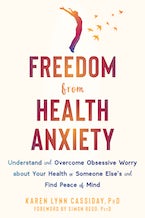By Karen Lynn Cassiday, PhD, author of Freedom From Health Anxiety
Does your mind get stuck on worry that a bump, rash, headache, or illness symptom is the beginning of a terrible disease? You are not alone, and you are not crazy, but you might have a health anxiety disorder.
Illness (or health) anxiety disorder is what happens when you detect a physical symptom in your body that triggers worry about serious illness. For example, you notice an odd lump near your lymph nodes in the shower and then feel dread that cancer is spreading through your body. Then, if you are like others with similar worries, you desperately try to get reassurance by consulting the Internet or your health care team. No matter what you find or what your doctors say, you find that your mind keeps going back to the awful thought, “What if this time, it really is cancer? What if I am dying?” Then, you try to get more reassurance by doing more research and more consultation with anyone who might have experience or knowledge about the disease you fear.
A vicious cycle of worry, reassurance seeking, checking symptoms, and more reassurance seeking gets stuck even if your doctor tells you not to worry and that all is well. You realize that you are much more worried and anxious than others, yet you cannot stop the cycle. What is going on?
You might think that your problem is about securing future good health, however science shows us that your real problem is not knowing an effective way to manage uncertainty about your future health. If you are prone to worry, then your mind attempts to handle uncertainty by taking a better-safe-than-sorry strategy of focusing on the worst-case scenario. This approach feels like a good idea because you are making sure nothing bad happens, and being prepared just in case. The problem with this approach is your brain and body cannot tell the difference between imagined fear (thinking about getting cancer) and real danger (the doctor just said you have cancer).
This automatic alarm reaction makes scary movies and amusement park rides a thrill. It backfires, however, with health worries because your mind assumes that the false fear signals triggered by worry feel the same as getting a diagnosis of serious or terminal illness. Then, if you are like most people who worry, you accidentally reinforce the anxiety and worry by trying to find information or a doctor who will promise you that nothing bad will happen. Unfortunately, no one can predict the future and give you the guarantee that your worry demands. Then you are back to dealing with uncertainty by worrying and reassurance-seeking.
What can you do? Quite a bit, if you are willing to understand the problem has to do with how you handle worry as opposed to your health. The best way to handle worry is to do things that science shows to improve tolerance of uncertainty, and builds ability to live in a human body that always has the potential for illness and will eventually die.
- Do worry exposure practice by making yourself think about the worst-case scenario. Write down or say aloud the thoughts, feelings, sensations, and situations that you worry about over and over until they lose their sting and appear to be either absurd or just no longer sticky in your mind. This usually will take fifteen to twenty minutes or slightly longer the first few times you do this. Once you do this, it will be much more difficult to believe in your worries and feel the need to seek reassurance from the Internet or others.
- Fast from reassurance-seeking. Set up daily goals to stop researching, talking about, or asking about the symptoms you notice. You can either do this gradually or go cold turkey. Both methods work well so long as you decide not to give in to the urge to get reassurance once you place a ban on reassurance-seeking. This will improve your ability to trust your helpful thoughts that you are OK and only having a false signal of worry.
- Ask others to help you by refraining from giving reassurance or looking at the symptoms that trigger worry. Ask them to tell you, “Looks like your anxiety is really bothering you. I do not want to make it worse by talking about your health. What can you do besides get my reassurance?”
- Assume your health worries are accidental false signals that are best ignored.
- Remind yourself that no one knows the future and that if others can accept uncertainty about illness and death, so can you.
Karen Lynn Cassiday, PhD, is owner and clinical director of the Anxiety Treatment Center of Greater Chicago. She has served as president of the Anxiety and Depression Association of America (ADAA), and is author of The No Worries Guide to Raising Your Anxious Child.



 2024 Peace Playbook: 3 Tactics to Avoid Clashes with Your Partner
2024 Peace Playbook: 3 Tactics to Avoid Clashes with Your Partner